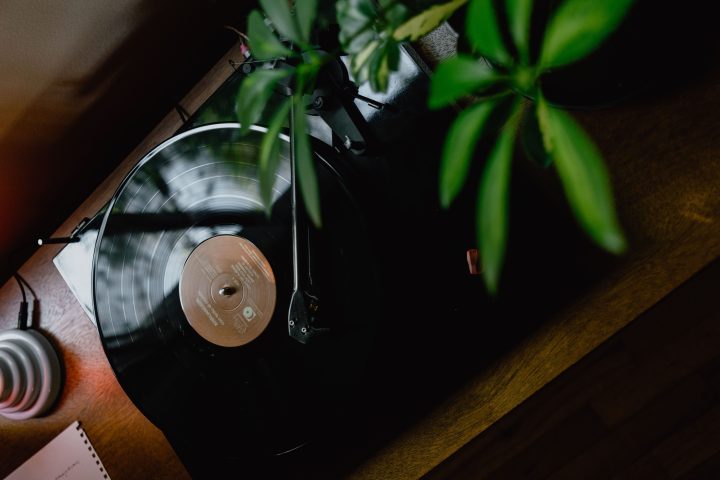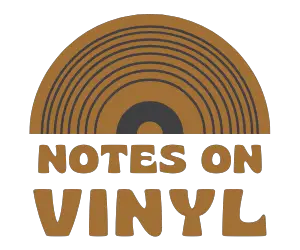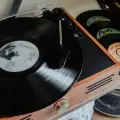Are you looking to get ahead and hip with all the lingo in the world of audiophilia? Are you scared of looking like a fool around your new friends when you don’t know the difference between a vinyl vs record?
Then step on up as we attempt to clear up any confusion.

Table of Contents
- Vinyl vs Record: What is the Difference?
- What is a Vinyl?
- What is a Record?
- Why the Confusion?
- Final Tones
- FAQs Vinyl vs Record
Vinyl vs Record: What is the Difference?
In the context of audio recordings, the terms “vinyl” and “record” often refer to the same thing, but there are nuances in how they’re used that can denote slight differences:
Vinyl: This term specifically refers to the material that records are made of. Vinyl records are made from a plastic material called vinyl (polyvinyl chloride or PVC), known for its durability and ability to produce high-quality sound. Over time, “vinyl” has also become a colloquial term used to refer to the records themselves, especially in the context of the resurgence of interest in vinyl records as a format for music enthusiasts seeking the analog sound quality and physical experience of handling and playing records.
Record: This term is more general and refers to any audio recording, regardless of its format. Records can be vinyl records, but they can also be other formats like shellac records (used before vinyl became the standard), compact discs (CDs), or even digital recordings. When people use “record” in the context of vinyl records, they’re referring to the physical disc that contains music or sounds etched into its surface, which can be played on a record player or turntable.
What is a Vinyl?
Well, to understand where the term vinyl comes from, we need to understand at least the baseline amount about the process by which vinyl records are manufactured. Their principal ingredient is polyvinyl chloride – a major component of its present toxicity. Because it is made from fossil fuels and is, subsequently, difficult to recycle without doing further damage to local ecosystems, it is a real plague.
Anywho, it is this material, this polyvinyl chloride, which is fashioned into the discs that you know and love. This is about the only reason records are referred to in this way.
As far as we are aware, it has not always been this way either. In fact, it is a result of the vinyl revival that this term has come to dictate what records are, as a result of the fact that many listeners know music via digital audio and digital music. In this way, vinyl albums have to be labeled thus so people can differentiate the experience of listening on the different mediums, which suggests that each does indeed offer its own unique experience, worthy, in fact, of differentiating them by name.
What is a Record?
In a similar way, the term record has its root in the manufacturing process of the disc, though, in this case, it comes from even further back in the process, namely the actual recording process for analog recordings. See, the clue really is in the name, just as it is for the term vinyl coming from the vinyl material and manufacturing process.
This will have been the term most likely used by record collectors back in the original era in which records were the main medium by which people consumed music. Other than live performances, it was in your record collection that you were able to escape from the quotidian and soar – you literally had to store music.
Another popular term at the time would have been LP. LP stands for Long Play, a term originating from the days when vinyl recording and sound reproduction were just beginning to take off worldwide, particularly throughout the western world. Originally recorded music came on 10-inch acetate discs and shellac records that were played at 78 rpm (revolutions per minute) for the so-called best audio quality. Since this did not leave very much space on the disc for music, recorded songs were shorter as a result.
With the dawn of the 12-inch disc on the more durable material vinyl, records were now able to play at 33 1/3 rpm, meaning that far more music could be fit on a disc of around the same size. Enough space, in fact, that Columbia boasted to fit whole movements of classical music on each side. Thus the Long Play record was born, offering superior sound and dynamic range to the cassette tape, though not offering anything like colored vinyl just yet. Yes, cassette tapes really are old, aren’t they?
Why the Confusion?
In the linguistic space of most hobbies, there are certain phrases and terms that are swapped without much forethought. There are rarely hobbies for which this is the case more than the collecting of vinyl records, where the utterance of one word can mean another thing entirely, hence the confusion between vinyl vs record for a beginner.
This kind of linguistic interchange is especially evident for newcomers to collecting, prospective enthusiasts who have yet to learn the specific terminology and how it might be implemented in real-world contexts. It is frankly confusing and can often leave a bad taste in the mouth of a new collector who feels like they are being excluded from an exclusive, cult-like society.
Vinyl record collecting is not so dissimilar in fact, excluding those elements that tend to get initiates in trouble with the law unless, of course, you are talking about illegal raves and sound system culture. Many record collectors prize the exclusivity and rarity of the medium (and its sound quality over digital recordings) and are, therefore, overjoyed to meet other collectors like themselves. It is a democratized medium, for the consumer and often by the consumer, by its very antiquated nature.
Final Tones
So, there you have it! Hopefully, you are now feeling ready and able to tell the difference between vinyl vs record.
FAQs Vinyl vs Record
Why is a record called a vinyl?
This term comes from the process by which records are manufactured and the fact that we are viewing them from a digital age of compact discs and the like. The main ingredient when manufacturing records is polyvinyl chloride, hence the term. The term record comes from further back in the process, before even the mastering stage, referring to the fact that they are a record of a musical performance. Hence, a record player.
Is it vinyl or vinyl record?
Either work, though equally, both will likely get you barred from your local record store. Audiophiles tend to have a particular pet peeve toward record collectors who refer to records as vinyl, citing the fact that vinyl is the ingredient by which they are manufactured, not the process by which they are made (i.e. a record is a record of a performance).
Does vinyl actually sound better?
Neither inherently sounds better than the other. Both vinyl records and digital offer listening experiences that are distinct from one another. Vinyl is a warmer and more nostalgic thing, whereas digital recording can offer a considerably wider, if colder, frequency spectrum, leaving more space for high frequencies and technical details.






